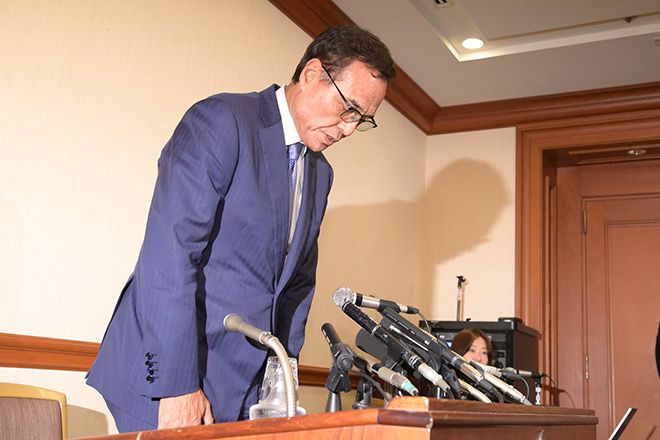Former Suntory Holdings chief Takeshi Niinami on Sept. 3 said a police investigation that led to his resignation is actually focused on a “second” package of an imported supplement that he knew nothing about.
He said the first supplement package that he bought in the United States for jet lag was sent to Japan, but he never possessed or used it because it was likely thrown into the trash.
At a regular news conference of Keizai Doyukai (Japan Association of Corporate Executives) in Tokyo, Niinami again proclaimed he did nothing wrong and indicated he wished to continue as chairman of the organization.
“I believe I am innocent, but I will leave the decision to the highly transparent system of Keizai Doyukai and refrain from my activities for now,” he said.
Niinami resigned as chairman and CEO of Suntory Holdings Ltd. after Fukuoka prefectural police on Aug. 22 searched his home in Tokyo on suspicion of violating the Narcotics Control Law.
Although the search turned up nothing illegal, Suntory’s board said Niinami’s actions that led to such suspicions were “unbecoming of a leader in his position” and called for him to step down.
Niinami on Sept. 1 submitted his resignation, which was accepted.
“Ultimately, it was my carelessness that led to this situation, stemming from my purchase of a CBD (cannabidiol) supplement. I apologize for causing a disturbance in society,” he said.
Niinami explained how he bought the supplement.
“I believed it was a legal product and purchased the CBD supplement in the United States,” he said. “It is a commercially available product, and similar products from the same brand were also sold in Japan.”
He said he originally planned to bring the supplement to Japan himself after his business trip to the United States in April. However, he had to travel from the United States to India via Dubai.
His acquaintance in New York told him that the supplement could cause legal problems in these countries, Niinami said.
“This acquaintance is a very famous person who gives health advice to me and other well-known people. (This person) recommended this supplement, said it is legal in Japan, and offered to arrange to bring it into Japan and have it sent to my home.”
However, Niinami said it appears his family disposed of the supplement before he could receive it.
“Because I travel abroad often, my family and I have an agreement: If we receive something from a sender we don’t know well, we throw it away,” he said. “I believe the supplement probably never reached me because it was likely discarded by my family.”
Niinami said the target of the police investigation is actually a different supplement package that the acquaintance in New York shipped to a younger brother in Fukuoka Prefecture in August.
“The brother was apparently supposed to send the package to my home, but he was arrested,” Niinami said.
“This second shipment was completely unexpected for me. I was never told about it, and I don’t know if the supplement was the same as the one that I purchased,” he said.
He said he became the target in the investigation because he was apparently supposed to receive the package.
Niinami emphasized that he neither possessed nor used the supplement within Japan, and that he never instructed anyone to import it.
“I broke no laws and believe I am innocent,” he said.
Asked why he bought the supplement in the first place, Niinami said it was for health reasons.
“I travel a lot for work and suffer from severe jet lag. The primary reason was that an acquaintance, who looks out for my health, strongly recommended it,” he said.
On why he bought the supplement in the United States, he said: “It is far cheaper in the U.S. than in Japan. It was for economic reasons.”
Keizai Doyukai Deputy Chairman Mutsuo Iwai, who is chairman of Japan Tobacco Inc., will temporarily take over chairman’s duties from Niinami.
The association will assemble an ethics review committee and decide on Niinami’s status later this month.

